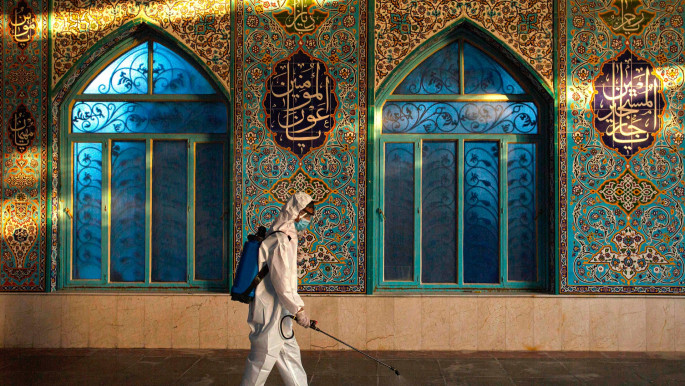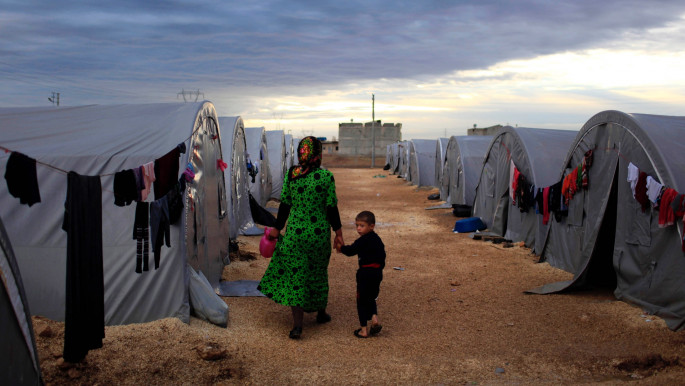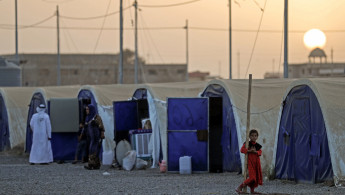'Resilience has its limits': The heavy toll of coronavirus on Iraq's displaced
"Even resilience has its limits," says Marie Courvasier, Communication Officer for the French NGO Premiere Urgence Internationale (PUI).
Although it's difficult to assess official numbers, "suicide attempts, depression rates and family violence have been increasing, exacerbated by the difficult living conditions" of families being confined in small tents, and losing their jobs. IDPs have also been isolated from social workers and psychologists who were helping them.
Psychological support
According to the United Nations Office for the Coordination of Humanitarian Affairs (OCHA), there are approximately 1.4 million IDPs in Iraq. Out of 6 million people displaced during the height of war, more than 4.5 million have returned to their communities, but return rates slowed significantly during 2020.
"I was following between 20 and 25 cases before the pandemic. Now I have at least 35," counts Bayda, a psychologist with PUI in Bajet Kandala camp in the district of Duhok, Kurdistan Regional Government (KRG). "The number of beneficiaries needing psychosocial support has increased by 40 percent at least, compared to before Covid-19".
 |
Suicide attempts, depression rates and family violence have increased, exacerbated by difficult living conditions |  |
Since the confinement measures started in Iraq and KRG in March, the mode of operations for psychologists and social workers in the camps has been disrupted. During the several lockdowns which took place in spring and summer, nobody could access the camps, sometimes for weeks.
The only exception was that "some of the community workers live in the camp", explains Hivine Ali, Mental Health and Psycho-Social Support Officer with UNHCR in Iraq. "Even when none of us could access the camp, they were there and knew exactly what was going on. They have been the most added value".
 |
|
| Read more: Moria camp tragedy is a wake-up call for Europe's failed migration policy |
But psychologists like Bayda had to reorganise their work mode to be able to conduct the follow-up at distance. This took time, impacting on the patients.
"All recreation activities stopped. We did an assessment call at the beginning of the pandemic. When we started to work by phone, two months after the beginning of the pandemic, most of the beneficiaries were afraid and in anxiety, because of this new situation," recalls Omar Aamr, a social worker with Handicap International.
"We are now conducting Psychological First Aid sessions on the phone. It's better than nothing, but it's not a face to face session".
Emotional connection at a distance
Properly providing a psychological follow up when specialists cannot meet in person or get physically close to their patients has proved challenging, especially establishing a connection over the phone with a traumatised child confined in an IDP camp.
"Before it was easier because I could use more communication tools such as body language, reading facial expressions," Bayda says. She received several trainings on remote follow-up and support from the technical coordination team, but "at the beginning it was really challenging".
 |
Providing psychological support when specialists cannot meet in person or get physically close to their patients has proved challenging |  |
"I have always relied on the use of body language, observing the expression of feelings when sitting face to face," agrees Omar, who has worked in many camps in Nineveh since 2017.
Since the pandemic, he mostly works with calls and just relies on listening. But with his patients living in small tents all together with the whole family, and lacking privacy to share confidential information, the conversation is often complicated.
 |
|
| Read more: Fighting fake news in Iraq's battle against Covid-19 |
"This affects the result of my work and builds a wall between me and the patient. I feel like I lost connection with the beneficiaries, and audio calls are very difficult because internet quality is very bad". And it is even more difficult with children. "The problem is not just the fact of talking on the phone with the child, but how to properly deliver the ideas and concepts to them," he explains.
"I used to propose activities to do together face to face, especially with handicapped children or those who are socially isolated". This included drawing, puzzles, or any games which could increase their cognitive activity.
 |
There are approximately 1.4 million internally displaced people in Iraq |  |
"I used to give them some exercises to do as a game and physical exercises, for example to increase reflexes and the mobility of muscles". But with both the therapist and patient each confined in their own living spaces, "some of my patients regressed to the previous condition," he laments.
Life in camps disrupted
In the crowded context of IDPs camps, where people live in small tents with all of their family, "everyday a lot of people naturally gather outside the tents, chatting and having a peaceful moment", says Hivine Ali. The confinement measures contributed to an increase in both stress and anxiety.
 |
|
| Read more: For Middle East refugees, social distancing is a privilege few can afford |
"People were respecting them [the measures] but were not happy," recalls Bayda. "Beneficiaries suffered from social isolation, some were scared from the virus, some did not believe in its existence... Anyway, I could not push them to go outside and interact, as I would have done before," admits Omar.
After the assessment phase, some staff was accessing camps on a weekly basis. "I have set-up sessions respecting social distancing, spacing the appointments to avoid gatherings," says Bayda.
"Satisfaction rates increased, but some patients preferred to continue getting support remotely. When I went back to the camps, I really felt my colleagues were afraid of me," exclaims Omar.
"And I have to admit that despite all the prevention measures, even me, I feel worried sometimes".
Sofia Nitti is an Italian video journalist based in Erbil, Iraq
Follow her on Twitter: @SofiaNitti



